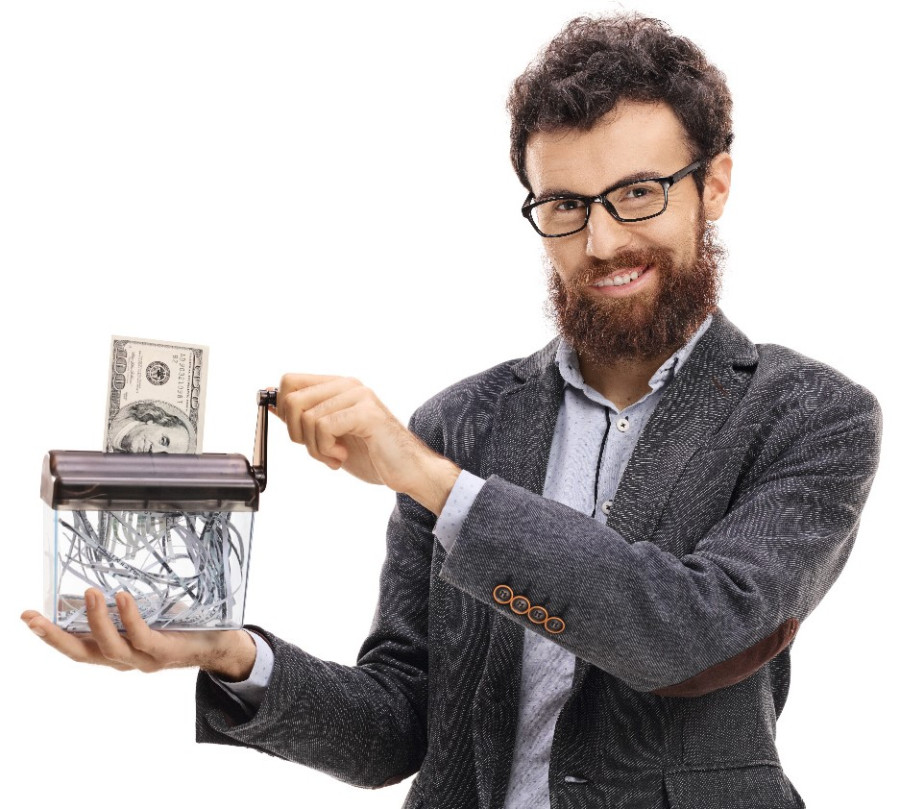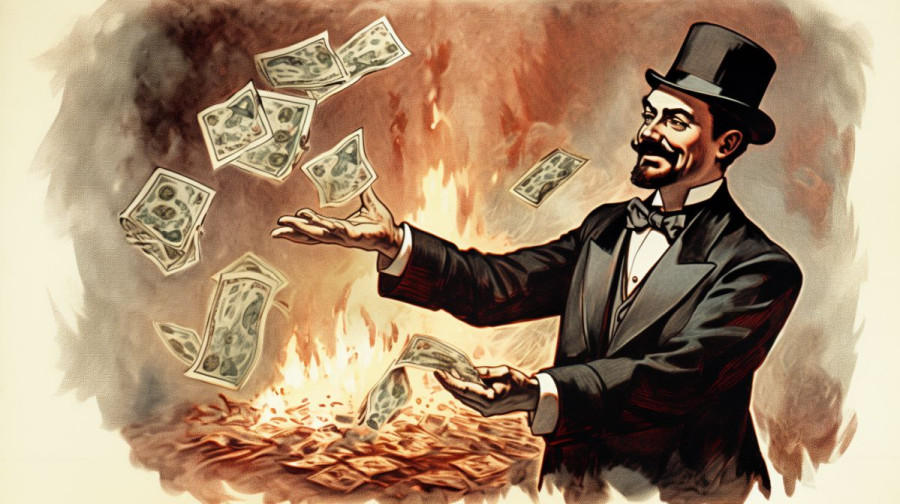Before you buy that new magic trick, stop, take a breath. Let's talk about what this really means for your growth as a magician.
I just went through a hard process. I destroyed most of my magic books, sold or gave away my props, and whittled my entire storage-locker magic collection down to a couple plastic bins. I can't deny it was an emotional struggle as I sorted through every piece and had to ask the tough question; does it stay or go?
Now, I'm at the other end of that epic purge, and trying to find my footing as a minimalist magician.
The biggest challenge I face now is the temptation of buying new stuff. The day I'm writing this I have received a handful of emails from magic shops announcing their Black Friday deals. This is the peak season for shopping, magic and otherwise. The time of greatest temptation.

Magicians are addicts, and we rely on our dealers for a fix.
The ads are written to trigger us. In one way or the other, they are telling us that THIS new item is THE thing that will give you the BEST reactions you've ever had. That you'll get more laughs, more applause, if you own this trick. That people will like you more, if you own this trick.
It's all a bit of a medicine pitch, selling snake oil to cure whatever ails you. We're buying because we love magic. Even "professional magicians" have the heart of an amateur, excited to try a new toy.
I don't want to step on that buzz, like a dentist handing out toothbrushes at Halloween. Magic is your hobby, and you can enjoy your hobby any darn way you please. Go nuts with your retail therapy!
Just wait for the crash.
That shiny new trick gets tossed in "The Drawer." Something about it doesn't suit you. It doesn't work as promised. It's totally impractical for your performance venue. Maybe it's all great, but even when the stars align it can be quickly forgotten for the next new thing.
There's often more buzz about a new magic book before it comes out, pre-orders line up, and then nothing but crickets once it's published. "Look great," you say, "just skimmed it so far!"
I write these words not as a preacher, but a fellow addict, currently in recovery. Let's talk about a path forward...

How To Spend Less Money on Magic
1) Bring out your dusty magic.
It's everywhere. Empty your closets, cupboards and shelves. Dump it all in a pile in the middle of the room. You've been hiding it away, out of sight, out of mind. If you want to do something about it you have to stare it in the face.
2) Do the math.
This pile of stuff, tricks that you do not use, has cost you hundreds and likely thousands of dollars. You probably want to ignore that hard fact, because the sum total hurts! However, you aren't going to change your ways "just because"... you will only make a positive change if you feel the pain of your past.
3) Understand it cost you a lot, but has virtually no value.
It has no value to you personally because it is taking up space in a dark closet. (That's actually a negative value to you.) And, as I was so recently reminded, it has very little value to other magicians. Look at the end of a magic swap meet, and see all the booths packing up stuff that they literally could not give away. Magic is a liability, not an investment.
4) Figure out why you bought this stuff, and identify your own behaviors.
If you can recognize a pattern, you can work to avoid falling for those same triggers. I always have a soft spot for books, because I believe they are the best source of magic knowledge, and the more books I own the more knowledgeable I can be. For the first couple years that may have been true-ish, but now I find that only applied knowledge becomes true wisdom. Simply owning the book does nothing. So, I need to be aware of and correct my behavior.
5) Mind your marshmallows. (Curb impulse buys)
The simplest strategy I employed to curb my magic spending was by simply forbidding impulse buys. You know the table rush at the end of a magic lecture? Don't do it! When I was attending a lecture I would do my research on the lecturers catalog of products and, with a cooler head, examine what I might be interested in buying.
OF COURSE you want to buy a trick right after you see it successfully performed! It's an emotional high point! Wow! Yes! I want that!... (one day later) ... why did I buy this?
If you didn't have time to pre-evaluate, give yourself time to cool off. If you're at a convention, you probably have the same chance to buy the trick tomorrow. Sit on it.
6) Don't give in to the FOMO.
The Fear Of Missing Out is basic Marketing 101. Create a sense of urgency in the buyer to motivate action. You are being manipulated.
Consider this: a 30% OFF sale is still 70% ON. (whoah!) Looking at an average $30 magic trick, the sale offers a savings of $9... but you're still spending $21. Let's say you rush into buying a trick on sale, and find it doesn't work for you. That's now $21 sitting in "The Drawer", essentially a black hole of value. That means you wipe out any potential savings on the next THREE tricks you buy on sale. You're better off taking your time and spending full price... or patiently waiting for the next sale.
You could have easily purchased that coveted high-priced magic trick that you REALLY want "but can't afford" if you had simply not bought some of the smaller priced items in The Drawer.
7) Make a prioritized wishlist.
At any moment there are probably at least 10 new things on your wishlist that you want. If not, a quick browse of a magic shop website will fill it up right quick.
I'm working on not making random buys, but rather putting everything through a queue. I've got a lot of things I'd like to buy next, but which is most important?
When something new comes up, don't just put it at the end of the list, but rather slot it in a spot according to its priority. If each new desire is given some careful thought, it will help you to make more strategic purchases.
You may find some items continually getting bumped to the bottom of your list. You may want them, but it turns out they aren't all that important to you. Congratulations! Scratch it off the list and save your money!
8) Know what works for you with guidance from a "Magic Paradigm"
This is something I first learned about from Jim Pace's "Restaurant Workers Handbook". (and something I'm going to be writing about in more depth soon)
In a nutshell, it's a way to look at a trick and use a scorecard, of sorts, to give it an objective value based on your needs as a magician.
For example, if you generally perform close-up magic, your Magic Paradigm would dock points when a trick has props that don't fit in your pocket.
It works on a points system so that it removes the "gut feeling" and emotion from purchasing decisions.
I'll soon be exploring this idea further, but for now just think about a list of requirements that a magic trick needs to have before you (personally) can get some good use out of it. Run each prospective purchase through this test, and only buy it if it passes!
Further Reading: "Your Personal Magic Criteria"
9) Understand the tricks are not greener on the other side.
The magic market is flooded, absolutely flooded, with new products each and every week. By the hundreds!
Each and every one of them is touted as the greatest new thing, but... they aren't. It's truly rare that a new trick is substantially different than that which has come before. If you're not using what you already have you won't use the improvement.
Even if it is "revolutionary" in some way among magicians, it is incredibly unlikely that a general public audience (remember, the people we supposedly do this all for?) would have the faintest inkling of this revolution. If the end result, in performance, is not noticeably different, it's not worth $60 bucks.
10) Connect with your local magic club.
I feel that much of buying magic comes back to the emotional high we get from the enjoyment of new magic. Well, I've often found that same buzz from getting together with other magicians.
It doesn't feel the same with online groups, so get out of the house and find the nearest IBM Ring, or whatever. you have nearby.
You'll get to learn and see new magic without burdening your storage cupboards. Maybe you'll get to see that hot new trick performed in person and realize it's not as great as the video made it out to be.
11) Spend MORE money on magic stuff.
Wait, what?!? I mean in terms of individual props. Over the long term, you receive more value from a six hundred dollar set of Linking Rings than you do from a sixty dollar set of Linking Rings.
When it comes to craftsmanship, a well made prop will last longer, and function better, which means you will more likely perform it. The higher investment financially also leads to more investment personally, and you'll work harder to make good use of it.
Note: This point is moot if you're still not buying LESS magic.
12) Ultimately accept that you cannot buy your way to being a better magician.
There is no trick/book/dvd/download that is going to do it for you. It takes work, dammit!
Hmm, twelve steps? Probably just a coincidence.
What do you think? What does your Magic Drawer look like? What will be the hardest step for you to follow? Leave a comment below.
Hey Ryan! You have a magic shop on this very website!!! Aren't you a big fat hypocrite?
First of all... rude! Secondly, I tend to sell my stuff with a zero-hype description. In fact, when people would ask me about Baby Bow, one of my higher-priced props, I often encourage them to watch the entire 30 minute instruction video BEFORE they buy it... in case they had any doubts about the routine.
I don't do big sale promotions as I set my prices to be fair year-round, and I'm happy to chat about what's important to you in a magic trick to make sure it's a fit. I'm selling professional props for performers, and I'll discuss every detail of it with you before you choose to make a purchase. Ask me anything.
Basically, I'm trying my best to do everything I can to help support you making better buying decisions.